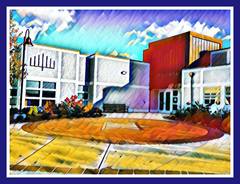Our Mission & History
Our Mission & History
Welcome to Temple Sinai. We are a Reform Jewish congregation that offers a wide array of opportunities for prayer, learning, and community involvement. Our mission is to inspire our members to integrate Jewish values and practice into their everyday lives, being inclusive and creative while also honoring tradition. We celebrate our Jewish lives together in an intimate and caring synagogue, perform acts of tikkun olam – repairing the world – and seek to pass on Jewish identity l'dor vador – from generation to generation."
Our History
 Temple Sinai was established in 1958 as an outgrowth of the Sharon School of Jewish Education. Having no denominational affiliation, the group determined that the time had come for its new congregation to join the Union of American Hebrew Congregations in order to represent the Reform movement in Sharon.
Temple Sinai was established in 1958 as an outgrowth of the Sharon School of Jewish Education. Having no denominational affiliation, the group determined that the time had come for its new congregation to join the Union of American Hebrew Congregations in order to represent the Reform movement in Sharon.
At the time of the founding of Temple Sinai, families were moving out of the historic Jewish neighborhoods of Mattapan and Dorchester, and Sharon, was a quiet town known for its summer cottages around Lake Massapoag and its summer music festival.
The first membership meeting was held at the former Bell House (now the Chabad Center) on February 26, 1958, at which time 98 families paid a $10 membership fee to join Temple Sinai. Arrangements were made to use the Bell House for religious services and school. Dr. Joseph Sacks was the first president, and Rabbi Milton Weissberg, of blessed memory, became the first spiritual leader. Cantor Morris Gordon, of blessed memory, became the first cantor in 1958 and remained cantor until his retirement in 1977. In less than a year, the Bell House became too small to hold the growing congregation. The Ames Street building was dedicated in January 1960. It was expanded in the 1970s.
By 1998, the congregation had grown, and it was time once again to expand our facilities. In 1999, the congregation voted to build a new synagogue on Canton Street in Sharon. In December 2000, driving between the raindrops, the Temple Sinai family moved from Ames Street into its new building on Canton Street, with a parade of Torahs through the streets of Sharon.
In 2010, the Jewish Community Center Gilson Early Learning Center moved into Temple Sinai's lower level, adding a preschool to the Temple community. Temple Sinai has since grown from being the town of Sharon's Reform synagogue to a synagogue that draws from the entire South Area of Boston.
A number of Rabbis, Cantors, and Cantorial soloists have served Temple Sinai over the decades, and we are currently served by Rabbi Joseph Meszler (2005-today) and Cantor Becky Khitrik (2014-today).
Reform Judaism
Throughout history, Jews have remained firmly rooted in Jewish tradition, even as we learned much from our encounters with other cultures. Nevertheless, since its earliest days, Reform Judaism has asserted that a Judaism frozen in time is an heirloom, not a living fountain. The great contribution of Reform Judaism is that it has enabled the Jewish people to introduce innovation while preserving tradition, to embrace diversity while asserting commonality, to affirm beliefs without rejecting those who doubt and to bring faith to sacred texts without sacrificing critical scholarship.
Reform Judaism affirms the central tenets of Judaism - God, Torah and Israel - even as it acknowledges the diversity of Reform Jewish beliefs and practices. We believe that all human beings are created in the image of God, and that we are God's partners in improving the world. Tikkun olam — repairing the world — is a hallmark of Reform Judaism as we strive to bring peace, freedom and justice to all people.
Reform Jews accept the Torah as the foundation of Jewish life containing God's ongoing revelation to our people and the record of our people's ongoing relationship with God. We see the Torah as God inspired, a living document that enables us to confront the timeless and timely challenges of our everyday lives.
In addition to our belief that Judaism must change and adapt to the needs of the day to survive and our firm commitment to Tikkun Olam, the following principles distinguish Reform Jews from other streams of Judaism in North America.
Reform Jews are committed to the principle of inclusion, not exclusion. Since 1978 the Reform Movement has been reaching out to Jews-by-choice and interfaith families, encouraging them to embrace Judaism. Reform Jews consider children to be Jewish if they are the child of a Jewish father or mother, so long as the child is raised as a Jew.
Reform Jews are committed to the absolute equality of women in all areas of Jewish life. We were the first movement to ordain women rabbis, invest women cantors and elect women presidents of our synagogues.
Reform Jews are also committed to the full participation of LGBTQ+ individuals and families in synagogue life as well as society at large.
Sun, November 9 2025
18 Cheshvan 5786
Quick Links
Temple Sinai of Sharon
25 Canton Street
Sharon MA 02067
p: (781) 784-6081
e: info@temple-sinai.com
Privacy Settings | Privacy Policy | Member Terms
©2025 All rights reserved. Find out more about ShulCloud







